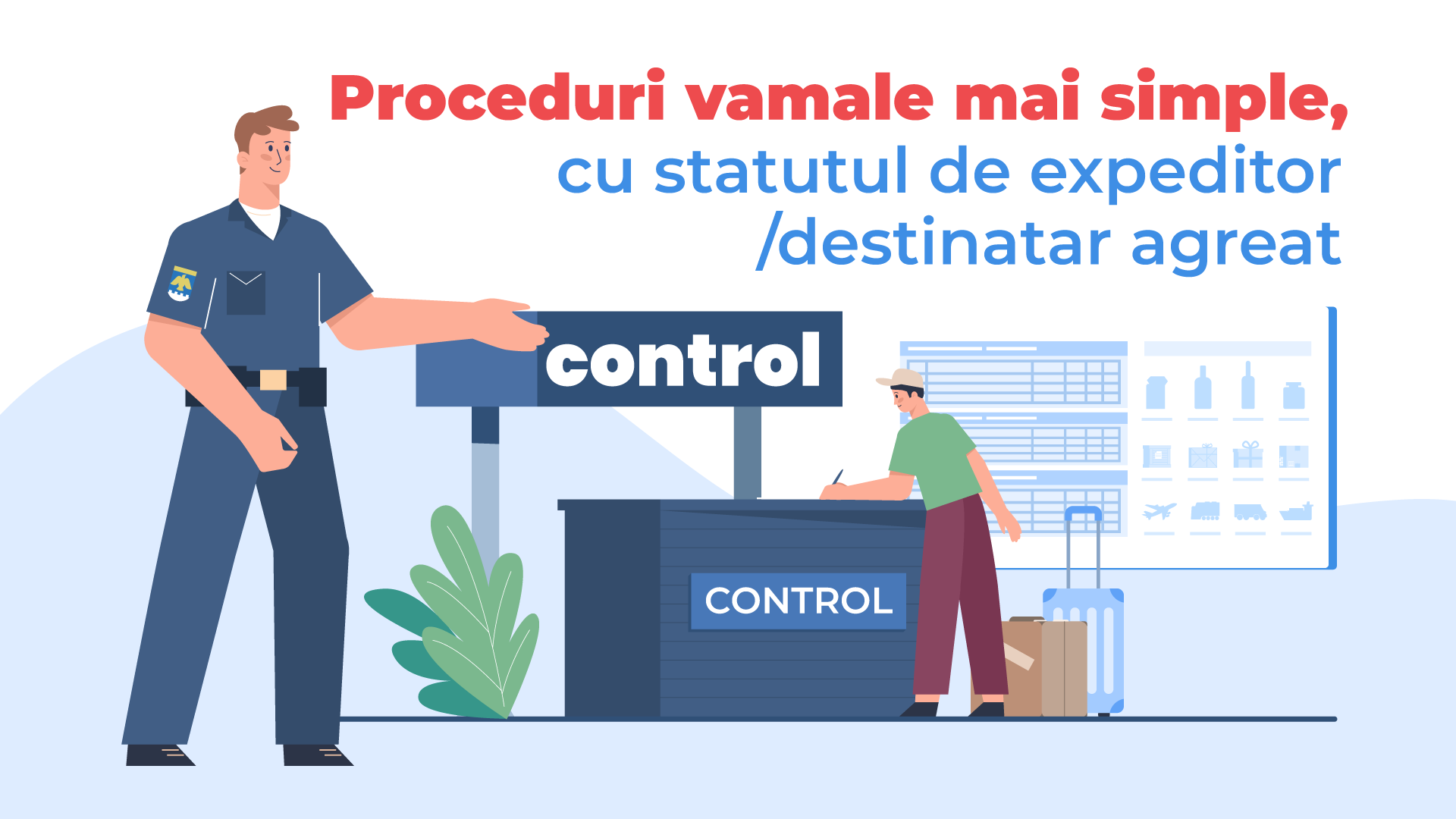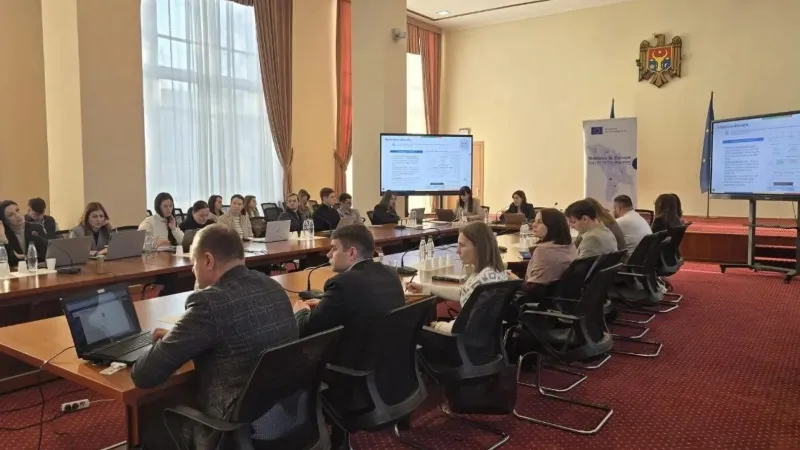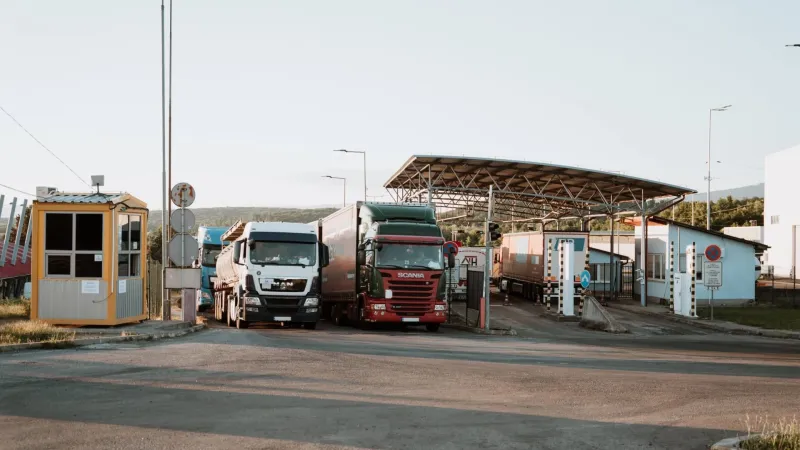
Proceduri vamale mai simple, cu statutul de expeditor/ destinatar agreat
Noul Cod Vamal vine să simplifice și mai mult interacțiunile operatorilor economici cu serviciul vamal. Aceștia pot beneficia de statutul de expeditor/destinatar agreat, care le oferă oportunitatea să-și desfășoare afacerea mai eficient și mai rapid.
Statutul de expeditor/ destinatar agreat presupune o serie de simplificări vamale care permit operatorului economic să asigure toate procedurile din confortul biroului său, să facă schimb de informații cu autoritățile vamale pe cale electronică, asigurând un proces rapid, securizat și economic din punct de vedere al costurilor.
Cum poate fi obținut statutul de expeditor agreat?
Un expeditor agreat este o persoană autorizată de către autoritățile competente să efectueze operațiuni de tranzit fără a prezenta mărfurile la postul vamal de plecare. O condiție pentru utilizarea acestei proceduri simplificate este ca expeditorul agreat să dețină un sistem electronic adecvat pentru schimbul de informații cu posturile vamale de plecare în sistemul electronic de tranzit. Persoana respectivă este titularul regimului. Mărfurile trebuie să fie sub controlul său, în localurile sale specificate în autorizație, în momentul depunerii declarației.
Pentru a obține o autorizație de expeditor agreat, operatorul economic trebuie să depună o cerere prin intermediul Sistemului de Decizii Vamale (SDV), pe care îl poate găsi pe portalul trade.gov.md, rubrica e-customs. Chestionarul de autoevaluare trebuie completat și atașat.
Autorizația se acordă solicitantului în următoarele condiții:
- este stabilit pe teritoriul vamal;
- declară că va folosi în mod regulat regimul de tranzit;
- deține o autorizație pentru utilizarea garanției globale;
- respectă criteriile stabilite la art. 39, 41 și 42 al Codului Vamal.
Statutul de expeditor agreat permite titularului:
- să creeze declarația de tranzit, înregistrând în sistemul electronic de tranzit:
- numărul de sigilii și identificatorii individuali de sigiliu (dacă s-au aplicat sigilii);
- termenul în care mărfurile trebuie să fie prezentate la biroul vamal de destinație;
- itinerarul prevăzut.
- să depună declarația de tranzit la postul vamal de plecare, fără a avea obligația de a-i prezenta acestuia mărfurile;
- să transmită și să primească notificări privind acceptarea declarației și acordarea liberului de vamă pentru mărfuri.
Expeditorul agreat aplică sigiliile speciale, având nevoie, prin urmare, de o autorizație separată. Avantajele de care poate beneficia expeditorul agreat:
- depunerea declarației de tranzit fără prezentarea mărfurilor la postul vamal;
- reducerea timpului de vămuire;
- locuri multiple aprobate.
Care sunt avantajele operatorului economic care deține autorizația de destinatar agreat?
Autorizația de destinatar agreat îi permite operatorului economic să primească mărfurile în localurile proprii sau în orice alt loc specificat, fără a le prezenta la postul vamal de destinație. Mărfurile plasate sub regimul de tranzit trebuie să fie prezentate, împreună cu documentele corespunzătoare, la postul vamal de destinație.
O condiție pentru utilizarea acestei proceduri simplificate este ca destinatarul agreat să dețină un sistem electronic adecvat pentru schimbul de informații cu posturile vamale de destinație în sistemul electronic de tranzit. Pentru a obține o autorizație, operatorul economic:
- depune o cerere prin intermediul Sistemului de Decizii Vamale (SDV) de pe portalul informativ trade.gov.md, rubrica e-customs;
- completează și atașează un chestionar de autoevaluare.
Autorizația se acordă solicitantului care îndeplinește cumulativ următoarele condiții:
- este stabilit pe teritoriul vamal;
- declară că va folosi în mod regulat regimul de tranzit;
- respectă criteriile stabilite la art. 39, 41 și 42 Cod vamal.
Statutul de destinatar agreat permite titularului:
- să primească mărfurile în localurile proprii fără a le prezenta postului vamal de destinație;
- să transmită mesajul „Notificare de sosire” postului vamal de destinație relevant;
- să primească și să transmită mesaje ulterioare cu privire la permisiunea de a descărca mărfurile și de a notifica rezultatele descărcării respective.
Avantaje statutului de destinatar agreat:
- închiderea regimului de tranzit fără prezentarea mărfurilor la postul vamal de destinație;
- accelerarea operațiunilor de tranzit;
- reducerea costurilor.
Conform Codului Vamal al Republicii Moldova, în baza unei solicitări, Serviciul Vamal poate să acorde autorizația de utilizare a unor proceduri simplificate cu privire la plasarea mărfurilor sub regimul de tranzit (expeditor/destinatar agreat). În situația în care solicitantul are statut de operator economic autorizat pentru simplificări vamale, prevăzut la art. 36 (alin.(3) lit.a) din Codul Vamal, criteriile prevăzute la art. 39, 41 şi 42 se consideră a fi îndeplinite şi nu se verifică.
Codul Vamal stabilește principiile juridice, economice și organizatorice ale activității vamale, normele și procedurile generale aplicabile mărfurilor introduse pe sau scoase de pe teritoriul vamal și este orientat spre apărarea suveranității și securității economice a Republicii Moldova.







